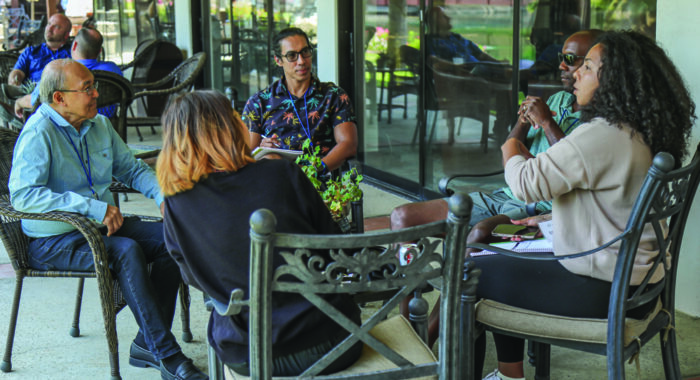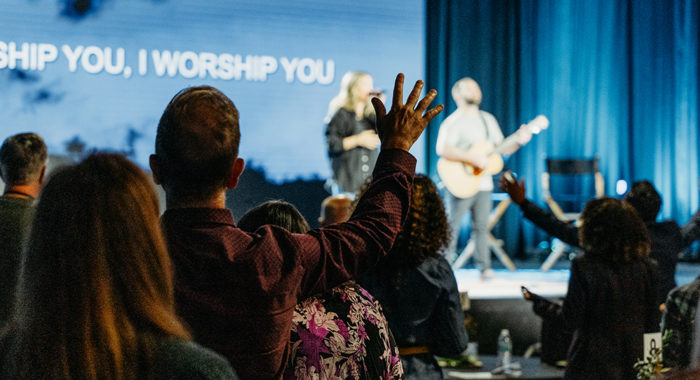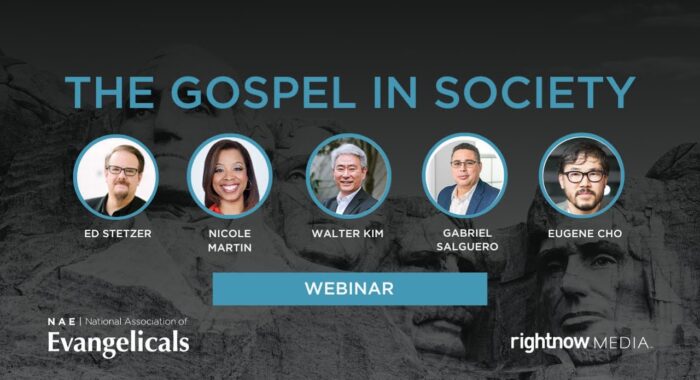He was the tennis version of Yoda — short, old, wrinkled, but strong with the force. My first tennis coach in high school was an elderly man with arthritis in his knees and shoulders. Whenever he stood on the court to run me through some drills, the emphasis was indeed on me running. He knew every angle and spin possible; he knew where to hit the ball, so that I would dash frenetically around the court only to return the ball exactly back to him. This is when the difference between playing tennis and being a tennis player became apparent. The former may have verve, the latter had wisdom.
Evangelicals believe the gospel reaches into every aspect of life, but we have been running around the court of culture, desperately trying to swat back the ideas coming at us. This whack-a-mole response to ideological threats (perceived or real) is frenetic, sometimes furious, and ultimately futile. What is more concerning for the honor and mission of Jesus are ways in which Christians are contributing to making ideological whack-a-mole our national sport.
We need a robust application of biblical faith for our common life in complex times. Instead of the prevailing metaphor of culture war, in which we defend our position, attack our opponents, and seek to win ground, a generative metaphor of culture reconstruction would be more attuned to a Savior who “did not come to be served, but to serve, and to give his life as a ransom for many” (Mark 10:45).
Assessing the Moment
While societal transitions have always occurred as one generation gives way to the next, several unique dimensions mark our current moment. Those under 18 are the first Americans to be born as a majority-minority generation, creating a cultural mosaic far more complex than ever before. Furthermore, the longer life span of Boomers, lower birthrates of subsequent generations, and changing views on family have introduced new dynamics. Differences are also geographical, between regions and even neighboring zip codes. And then we consider civilization more broadly and see that the place of religion has fundamentally changed.
The complexities also exist inside the church. In her work “Apostles of Reason,” historian Molly Worthen explores evangelicalism as a religious movement responding to specific challenges of modernity. She comments that “three elemental concerns unite [evangelicals]: how to repair the fracture between spiritual and rational knowledge; how to assure salvation and a true relationship with God; and how to resolve the tension between the demands of personal belief and the constraints of a secularized public square.”
Those shared concerns, however, do not lead to shared conclusions. The Bebbington Quadrilateral captures unifying and defining beliefs about Scripture and salvation, but how spiritual and secular knowledge relate or how Christians should operate in a pluralistic marketplace of ideas are profoundly unresolved within evangelicalism. What holds together — or pushes apart — young earth creationists and evolutionary creationists, or evangelicals who participated in Black Lives Matter marches and those who are trying to ban CRT? It is easier to get evangelicals to sign a statement of faith than to agree on an approach to culture.
Evangelicals now need to navigate our place in society as a marginal group, or at least, one among many. How are we to engage culture beyond conflict or compromise? How can we contribute to our life in a pluralistic society and live out our commitments to the sovereign claims of Christ over every corner of life? We need a public theology to lead our public discipleship to impact our public engagement.
Public Theology
Missiologist Lesslie Newbigin proposed that “to affirm the gospel as public truth is to invite acceptance of a new starting point for thought, the truth of which will be proved only in the course of a life of reflection and action which proves itself more adequate to the totality of human experience than its rivals.”
Public theology works out and applies the Scriptures for the Church within society as a whole and at a particular time. It is narrower than systematic theology, which arranges biblical revelation into broad philosophical and logical categories; it is broader than political theology, which often concentrates on policy concerns, statecraft and the duties of citizenship. This comprehensive understanding of faith is already central to the mission of the National Association of Evangelicals, and the increasing diversity of the NAE’s network is introducing fresh voices whose questions and contributions are vital to honoring Jesus more fully.
Public Discipleship
Human beings are not simply individual brains on sticks. Therefore, writing white papers on public theology will not be enough. We are formed within intertwined communities —families, neighborhoods, schools, churches, sports teams, social media—who share various practices, beliefs, rituals and ways of life.
Whether by design or by happenstance, every Christian is being discipled for their public engagements by cultural influences, but many are not discipled well. Public discipleship requires resources, events, curated experiences, collaborative endeavors, networked friendships, and long-term programs that are responsive to the Holy Spirit and formative in the ways people actually live and learn.
Public Engagement
Evangelicals must pursue a cultural redemption that reflects the call to “seek the peace and prosperity of the city to which I have carried you into exile. Pray to the LORD for it, because if it prospers, you too will prosper” (Jeremiah 29:7).
Sometimes evangelicals attack the very people they are called to evangelize. While the gospel as public truth must prophetically challenge society, the critiques should be tied to the command to love our neighbor. This is not a marketing ploy to improve the sullied image of evangelicals. It reflects a fundamental conviction about the witness of the gospel and the way of Christ to persuade rather than bludgeon people. Public engagement entails working for and working with others.
Disciplining the Mind and Mouth
Our intellectual and ethical conundrums are profound. Even when decisive action is required or Christian convictions must be upheld, today’s technological advances, biomedical possibilities, racial turmoil, debates about climate change, and shifting views on sexuality are all matters of immense complexity. These challenges, and a myriad of others, are boiling over in the context of deep social discord.
In developing principles and practices of knowing, Christians should show the kind of intellectual honesty and humility that we are asking of others. We do not want skeptics to reject the faith based upon simplistic assessments about church history or Christian theology. It bothers us when skeptics dismiss faith on the basis of a few articles that they read or a few conversations that they’ve had.
Conversely, when engaging with non-Christian people and sources of knowledge, we need discernment to receive what is true, refine what is helpful, reject what is false, and reimagine what could and should be. This is not easy. And humans naturally devolve toward the easy.
Doing this hard work demands disciplines of the mind to match the disciplines of the mouth when James exhorts us to “be quick to listen, slow to speak, and slow to become angry, because human anger does not produce the righteousness that God desires” (James 1:19—20).
Instead of a whack-a-mole response or a posture of culture war, the Scripture provides a template for how “to repair the fracture between spiritual and rational knowledge” and “to resolve the tension between the demands of personal belief and the constraints of a secularized public square.” The discipleship of such a biblical theology of knowledge is more a way to think rather than a what to think.
Catechesis of Complexity
The simplicity of our gospel presentation enables us to communicate clearly and quickly about God’s love, human sin and Christ’s redemption. But what enables the rapid growth of evangelicalism at times constrains its deeper growth. A faith so simply explained is too often left simplistic.
The luxury of thinking in this nuanced way of what and how we receive, refine, reject or reimagine requires time and patience in the study of Scripture and of society. Discipleship in this manner requires resources, events, curated experiences, collaborative endeavors, networked friendships, and long-term programs that are responsive to the Holy Spirit and formative in the ways people live and learn.
When my son graduated from high school, I was struck by what his teachers had asked of him. He studied calculus and physics; he wrote complex arguments about American history; he learned a second language and world geography. Many high school students are given complexity, while churches are far too content with a flannelgraph Jesus, seeking simplicity out of concern to make faith accessible. Our faith needs a catechesis of complexity.
Walter Kim became the president of the National Association of Evangelicals in January 2020. He previously served as a pastor at Boston’s historic Park Street Church and at churches in Vancouver, Canada and Charlottesville, Virginia, as well as a campus chaplain at Yale University. He preaches, writes and engages in collaborative leadership to connect the Bible to the intellectual and cultural issues of the day. He regularly teaches in conferences and classrooms; addresses faith concerns with elected officials and public institutions; and provides theological and cultural commentary to leading news outlets. He serves on the boards of Christianity Today and World Relief and consults with a wide range of organizations. Kim received his Ph.D. from Harvard University in Near Eastern Languages and Civilizations, his M.Div. from Regent College in Vancouver, and his B.A. from Northwestern University.




 View All Articles
View All Articles 





























